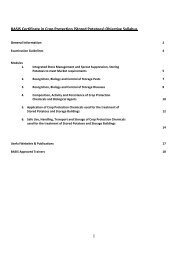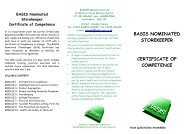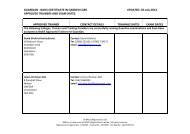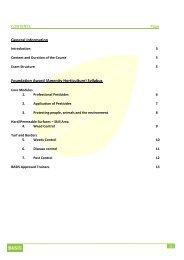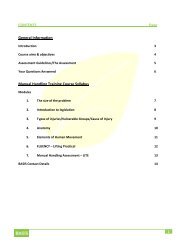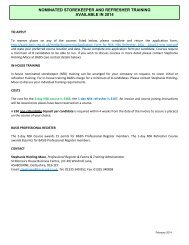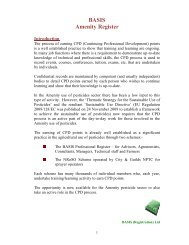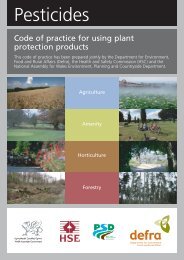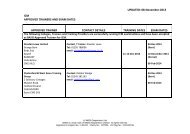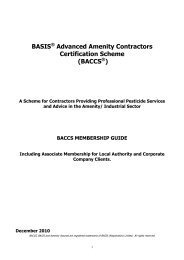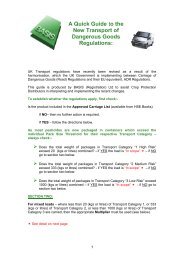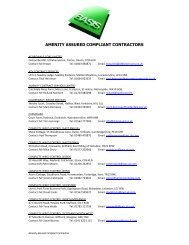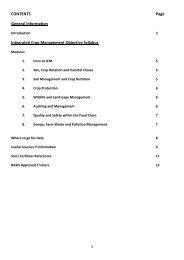FACTS Northern Ireland - Basis
FACTS Northern Ireland - Basis
FACTS Northern Ireland - Basis
You also want an ePaper? Increase the reach of your titles
YUMPU automatically turns print PDFs into web optimized ePapers that Google loves.
CONTENTS<br />
Page<br />
General Information<br />
Introduction 3<br />
<strong>FACTS</strong> Scheme - Objectives 5<br />
Composition of the <strong>FACTS</strong> Management Committee 6<br />
Terminology and definitions relating to the scheme 7<br />
The Certificate of Competence in Fertiliser and Nutrient Management<br />
Advice for Field Sales and Advisory Staff 9<br />
Your Questions Answered 10<br />
Exam Structure 12<br />
<strong>FACTS</strong> Pre-Training 13<br />
The National Training Syllabus - <strong>FACTS</strong> <strong>Northern</strong> <strong>Ireland</strong><br />
Modules<br />
% TOTAL TIME<br />
1. The soil in relation to plant nutrition 15% 15<br />
2. Organic nutrient sources 15% 17<br />
3. The nature and properties of fertilisers 5% 19<br />
4. Crop nutrients in plants and the factors influencing 20% 20<br />
nutrient management planning<br />
5. Use of fertilisers on the main crop groups in the UK 15% 22<br />
6. The transport, storage and handling of fertilisers 10% 23<br />
7. Application of fertilisers 5% 24<br />
8. Code of Good Agricultural Practice and legal and 15% 25<br />
other requirements to protect the environment<br />
Sample multi-choice questions for the <strong>FACTS</strong> Examination 26<br />
Sample Scenario question for the <strong>FACTS</strong> Examination 27<br />
Reference materials 29<br />
Useful website and publications 30<br />
The BASIS Diploma in Agronomy 32<br />
BASIS/<strong>FACTS</strong> Approved Trainers 35<br />
1
2<br />
© BASIS (Registration) Ltd<br />
BASIS is a trade mark of BASIS (Registration) Limited. All rights reserved.<br />
Registered in England No.: 1365343 Charity No.: 1077006 VAT Reg No.: 242/5497/56
<strong>FACTS</strong> SYLLABUS & INFORMATION<br />
Introduction<br />
<strong>FACTS</strong> is an independent non-statutory certification Scheme for advisers in plant nutrient management. It<br />
was established in 1993 following discussions with the trade associations connected with the industry and<br />
BASIS® (Registration) Ltd. At the present time there is no legal requirement for advisers and sellers to be<br />
certificated; however it was considered that setting up such a scheme was the responsible action to take in<br />
light of the environmental pressures and increasing technical requirements. The Scheme and initiative are<br />
fully supported by Defra and the Environment Agency.<br />
The <strong>FACTS</strong> Scheme is administered on behalf of the industry by BASIS® (Registration) Ltd which has<br />
administered a similar scheme for the pesticides industry since 1978. <strong>FACTS</strong> is controlled by a<br />
Management Committee that is chaired by an independent chairman with representatives of trade<br />
associations from the industry, including representatives from (AIC) Agricultural Industries Confederation.<br />
ADAS, the Association of Independent Crop Consultants (AICC), the Department for Environment Food and<br />
Rural Affairs (Defra), the Environment Agency (EA), the National Farmers Union (NFU), National Association<br />
of Agricultural Contractors (NAAC), the National Association of Principal Agricultural Education Officers<br />
(NAPAEO) and the Potash Development Association (PDA).<br />
Whistle Blowing Policy<br />
BASIS (Registration) Ltd is committed to the highest standards of openness and accountability. Therefore,<br />
we expect employees, candidates and others who work with BASIS who have serious concerns about any<br />
aspect of our work voice those concerns.<br />
To this effect BASIS has a whistle Blowing Policy. This procedure is designed to allow concerns of a public<br />
interest kind within BASIS to be raised, investigated and where appropriate, acted upon. Complaints may<br />
be any member of staff, candidates or those contracted to provide services to BASIS.<br />
To view the full Whistle Blowing Policy go to:<br />
http://www.basis-reg.co.uk/media/documents/430/index.html<br />
Dyslexia Policy<br />
BASIS (Registration) Ltd allows students diagnosed with Dyslexia to request special examination<br />
arrangements. Proof of dyslexia is required a minimum of 4 weeks before the exam date so that BASIS can<br />
provide special examination arrangements if required.<br />
For a full copy of our Dyslexia Policy please go to:<br />
http://www.basis-reg.co.uk/media/documents/TM%2015%20BASIS%20Dyslexia%20Policy%20-<br />
%20Sept%202011.pdf<br />
BASIS® is a registered trademark of BASIS® (Registration) Limited. All rights reserved.<br />
3
The <strong>FACTS</strong> Annual Scheme, (including the <strong>FACTS</strong> Information Service) and membership of the BASIS®<br />
Professional Register, which <strong>FACTS</strong>-registered advisers can join, have been devised in response to several<br />
pressures:<br />
Most people who take an interest in agriculture appreciate that if soil fertility is to be maintained then<br />
nutrients taken off in the crop or lost to air or water must be replaced. However, many of these people are<br />
also concerned about the actual or potential environmental impact that these losses can cause and they<br />
look to those involved to do what they can to minimise them. This is one of the pressures to which those<br />
advising farmers on nutrient management and fertiliser use must respond and was a driving force behind<br />
the establishment of the <strong>FACTS</strong> scheme. It allows farmers to identify those competent to advise them on<br />
all aspects of nutrient management including the requirements of the law.<br />
There is also political pressure to respond to environmental problems either by regulation such as Nitrate<br />
Vulnerable Zones (NVZ’s) or by other restrictive policies. These may be unwelcome but if action towards<br />
environmental improvement is not forthcoming, proposals for the more stringent measures will increase.<br />
Voluntary measures, such as <strong>FACTS</strong>, encourage the adoption of best nutrient practices and offer those<br />
involved in agriculture the opportunity to demonstrate that they are able to manage environmental<br />
pressures while helping their farmer clients optimise inputs. <strong>FACTS</strong> is based on the principles of Integrated<br />
Farm Management (IFM) promoted by LEAF – (Linking Environment And Farming) - and training is<br />
compatible with Integrated Crop Management training courses.<br />
There is also a need for advisers to continue their personal development. Life-long learning and Continuing<br />
Professional Development (CPD) are modern themes and for good reason. CPD is important to advisers for<br />
a number of good reasons and can help an individual keep abreast of:<br />
• Changes in the economics of agriculture<br />
• Climate change both short term and in the long term<br />
• Changes to equipment and products available<br />
• New research findings and subsequent recommendations<br />
• Changes in the public perception of agriculture and its effect on the environment and food quality<br />
It is increasingly down to individuals rather than employers to manage their careers. This means advisers<br />
must keep up-to-date and be able to offer evidence to their clients that they can be relied upon to have<br />
the necessary competences. Gaining a <strong>FACTS</strong> qualification is only the start. It needs to be followed by an<br />
application to either join the BASIS Professional Register and / or subscribe to the <strong>FACTS</strong> Annual Scheme to<br />
fully keep up-to-date and remain on the register of current <strong>FACTS</strong> Qualified Advisers. In the years ahead<br />
we can increasingly expect assurance schemes and crop production protocols to require advisers to be<br />
members of one or both of these schemes. Such initiatives also represent the most effective response<br />
from agriculture to its critics and, it is to be hoped, they may in time result in a reduction in the impact of<br />
nutrient losses.<br />
The <strong>FACTS</strong> Management Committee<br />
4
<strong>FACTS</strong> SCHEME - OBJECTIVES<br />
The overall aim of the Scheme is to ensure a high standard of proficiency of all those giving fertiliser and<br />
plant nutritional advice to end users, having due regard for the protection of the environment.<br />
To achieve these objectives the Management Committee will:<br />
a] develop and promote a certification scheme for those selling fertilisers to farmers and/or advising<br />
on the use of nutrients;<br />
b] establish and maintain a National Training Syllabus for those giving fertiliser and plant nutritional<br />
advice;<br />
c] identify and liaise with recognised training centres and those providing in-house training which<br />
provide instruction on the National Training syllabus;<br />
d] establish and monitor appropriate examination provision for trainees, whether trained by BASIS®-<br />
Approved Trainers, by in-house training or by home-study;<br />
e] approve a level of competence which candidates for certification should reach;<br />
f] maintain a Register of those certificated as competent to advise on fertiliser and plant nutrition<br />
products;<br />
g] gradually raise the general level of competence of advice given by the fertiliser and plant nutrition<br />
industry and others and keep under continuous review the standards of the Scheme, including the<br />
status of exemption holders;<br />
h] liaise closely with UK Government and the EU in order to have the registration scheme recognised<br />
and accepted by both UK and other EU Governments.<br />
5
COMPOSITION OF THE <strong>FACTS</strong> MANAGEMENT COMMITTEE<br />
Independent Chairman<br />
Nominated by trade associations in<br />
conjunction with BASIS and DEFRA<br />
• 2 Nominated Members from the AIC Fertiliser Manufacturers' Committee<br />
• 2 Nominated Members from the AIC Fertiliser Distributors Committee<br />
• 1 Nominated Member from ADAS<br />
• 1 Nominated Member from the Association of Independent Crop Consultants (AICC)<br />
• 1 Nominated Member from the Department for Environment, Food and Rural Affairs (Defra)<br />
• 1 Nominated Member from the Environment Agency (EA)<br />
• 1 Nominated Member from Land Based Colleges Aspiring to Excellence (LANDEX)<br />
• 1 Nominated Member from the National Association of Agricultural Contractors (NAAC)<br />
• 1 Nominated Member from the National Farmers' Union (NFU)<br />
• 1 Nominated Member from the Potash Development Association (PDA)<br />
• The Managing Director (or senior management representative) of BASIS® will be eligible to attend the<br />
meetings.<br />
* In addition an officer from the AIC and the <strong>FACTS</strong> Information Service attend the Committee by<br />
invitation.<br />
6
<strong>FACTS</strong> TERMINOLOGY AND DEFINITIONS RELATING TO THE <strong>FACTS</strong> SCHEME<br />
TERM<br />
<strong>FACTS</strong><br />
<strong>FACTS</strong> Qualified<br />
Adviser<br />
<strong>FACTS</strong> Annual<br />
Scheme<br />
<strong>FACTS</strong> Certificate /<br />
Exemption<br />
<strong>FACTS</strong> Training<br />
Syllabus<br />
<strong>FACTS</strong> Exam Passed<br />
<strong>FACTS</strong> Turf and<br />
other specialised<br />
<strong>FACTS</strong> qualifications<br />
Regional Training<br />
Centres<br />
<strong>FACTS</strong> Information<br />
Service (FIS)<br />
<strong>FACTS</strong> Member<br />
<strong>FACTS</strong> Workshops/<br />
Seminars<br />
<strong>FACTS</strong> Management<br />
Committee<br />
Field Sales and<br />
Advisory Staff (FSAS)<br />
DEFINITION<br />
Fertiliser Advisers Certification and Training Scheme. An independent nonstatutory<br />
certification scheme for professionals providing advice and information<br />
on the management of plant nutrients and fertiliser materials.<br />
Member of the BASIS Professional Register with the <strong>FACTS</strong> qualification or a<br />
member of the <strong>FACTS</strong> Annual Scheme..<br />
An annual subscription service available to professionals who have passed the<br />
<strong>FACTS</strong> exam or hold a <strong>FACTS</strong> exemption certificate. Benefits: membership card,<br />
entry on the <strong>FACTS</strong> Register and access to benefits of <strong>FACTS</strong> Information Service<br />
(FIS).<br />
A certificate of basic competence in fertiliser and plant nutrient advice for Field,<br />
Sales and Advisory Staff. Experienced advisers working with fertilisers for at least<br />
5 years prior to 1993 were awarded the certificate on the basis of their<br />
accumulated knowledge.<br />
The national standard on which all candidates will be assessed whether training<br />
takes place at recognised training centres, in-house or elsewhere.<br />
Recognised non-statutory qualification (multiple choice exam plus written<br />
recommendation exercise paper and viva) for those providing plant nutrient<br />
advice<br />
Specific qualification for advisers on amenity turf – other specific qualifications<br />
include <strong>FACTS</strong> Horticulture, <strong>FACTS</strong> Agriculture and <strong>FACTS</strong> Veg.<br />
Approved training centres that have agreed to run training courses based on the<br />
<strong>FACTS</strong> Training Syllabus. Approved Trainer details can be found at the rear of this<br />
booklet.<br />
<strong>FACTS</strong> Information Service provided by ECOPT as part of the <strong>FACTS</strong> Annual Scheme<br />
subscription. Provides four newsletters per year and access to free and impartial<br />
plant nutrient information via a Helpline and email contact<br />
Member of the <strong>FACTS</strong> Annual Scheme.<br />
Events organised by the <strong>FACTS</strong> Management Committee. Open to all <strong>FACTS</strong><br />
Members with a small attendance fee.<br />
Committee responsible for determining <strong>FACTS</strong> policy and maintaining the financial<br />
viability of the Scheme.<br />
Those employed by manufacturers, distributors, independent consultants, agents<br />
and Government bodies who are involved in selling and/or giving advice on<br />
fertilisers and nutrient management to end users.<br />
7
Office and Depot<br />
Staff<br />
Administrative<br />
means<br />
Direct Supervision<br />
Staff employed by manufacturers, distributors or agents who are office based and<br />
are permitted to take counter orders and telephone orders from end-users,<br />
provided no technical advice is given and the services of a current <strong>FACTS</strong> Qualified<br />
Adviser are available. This may be operated by "administrative means”.<br />
Un-qualified staff should have ready access to a qualified member of staff by<br />
means of telephone, email or fax. It is not necessary that there is a current <strong>FACTS</strong><br />
Qualified Adviser available on the premises at all times. A list of current <strong>FACTS</strong><br />
Qualified Advisers should be available at the depot giving telephone numbers and<br />
a contact point.<br />
Direct supervision of un-certificated staff should always take place except in the<br />
case of field staff training for certification where supervision, after initial training,<br />
may be exercised remotely on a daily basis. Such trainees are required to sit an<br />
examination for certification within three years of starting the job. Trainee staff<br />
will have received induction training by the company and will have been<br />
accompanied by a qualified member of staff on several farm/horticultural visits.<br />
All subsequent unaccompanied visits for sales and advice should be monitored by<br />
a qualified member of staff until such time as the trainee obtains the <strong>FACTS</strong><br />
qualification.<br />
8
THE BASIS® DILPOMA IN AGRONOMY<br />
Both the BASIS® qualification and the <strong>FACTS</strong> qualification are now a requirement for the BASIS® Diploma.<br />
Details of the BASIS® Diploma can be found on page 32, at the end of this booklet.<br />
THE CERTIFICATE OF COMPETENCE IN FERTILISER AND PLANT NUTRITION ADVICE FOR FIELD SALES AND<br />
ADVISORY STAFF<br />
Courses are offered by the BASIS® Approved Trainers listed in this book. These centres are prepared to run<br />
courses based on the national training syllabus enabling candidates to prepare themselves for the <strong>FACTS</strong><br />
Certificate of Competence.<br />
The course is based on at least five days of training, including examination. The national syllabus gives<br />
candidates an outline of the training requirements.<br />
All advisers who give advice on fertiliser and crop nutrient use are strongly recommended to obtain a<br />
Certificate of Competence within three years of entering the industry, during which time they should be<br />
working under the supervision of a qualified member of staff.<br />
9
YOUR QUESTIONS ANSWERED<br />
• DO I NEED TO TAKE A TRAINING COURSE IN ORDER TO SIT THE <strong>FACTS</strong> EXAMINATION<br />
Not necessarily, if you have enough technical knowledge and in-field experience already. However,<br />
candidates should ensure that they have been trained satisfactorily, either in-house or externally, and<br />
have had sufficient supervised field experience prior to entering for the examination. Following the<br />
introduction of the new NVZ regulations candidates should be able to understand and explain the new<br />
rules and will be examined in both written and verbal examination. They should have read and<br />
understood NVZ Guidance Leaflet No. 1 and Section 1 of RB209 (Principles of nutrient management and<br />
fertiliser use) before presenting themselves for the course and exam. It is important that, where<br />
necessary, the candidate should prepare in this way for the course - the course alone is unlikely to raise<br />
a candidate from minimal knowledge of nutrient use and relevant regulations to success in the exam. If<br />
they do not know these regulations they will not pass.<br />
• WHAT IS THE STANDARD OF THE COURSE<br />
The overall aim of the course is that at the end of training, coupled with previous practical experience,<br />
candidates will have a basic understanding of fertilisers and plant nutrition to enable them to give<br />
advice to farmers and growers which is both economically and environmentally sound. The emphasis<br />
will be on practical knowledge applicable when advising farmers and growers.<br />
• WHAT FORM DO THE TRAINING COURSES TAKE<br />
Normally a one-week residential block (at least 5 days) with an assessment on completion of the<br />
course. Day release or short blocks may be offered, depending on regional requirements.<br />
• WHERE ARE TRAINING COURSES HELD<br />
At selected training centres within the United Kingdom and also at other venues, both in the UK and<br />
abroad, organised by local training groups; a list of current Approved Trainers can be found on page 35.<br />
• HOW DO I APPLY TO TAKE A TRAINING COURSE<br />
Contact the Approved Trainer of your choice. Complete a training course application form and send it<br />
to the centre.<br />
• IS IT POSSIBLE TO USE CORRESPONDENCE COURSES OR EVENING CLASSES<br />
Not currently.<br />
• WHEN AND WHERE ARE EXAMINATIONS HELD<br />
They are currently held at each of the centres listed at the end of this book. Examinations are held<br />
when there are sufficient numbers to make them viable.<br />
• HOW DO I APPLY TO SIT THE EXAMINATION<br />
Complete an examination application form and return it to the centre of your choice. You will be<br />
notified when an examination is to take place. (Those attending a training course will automatically be<br />
entered for the examination and so do not need to apply separately.)<br />
• IF I FAIL THE EXAMINATION, CAN I RE-SIT<br />
Yes you can re-sit the exam; however, BASIS examinations are accredited on the Higher Education<br />
qualifications framework. One consequence of this is that we need to ensure procedures are in place<br />
to improve candidates’ chances of success in subsequent examinations following a previous failure.<br />
Where candidates have been examined unsuccessfully on two occasions, they will be required to<br />
retrain before attempting the exam for a third time.<br />
Candidates and trainers will be required to complete a form to confirm that they have retrained,<br />
particularly covering areas that were identified as ‘areas of weakness’ at previous exams.<br />
10
The form should be presented to the exam Chairman at the third exam attempt. Failure to confirm that<br />
retraining has taken place will result in a refusal to conduct the viva examination and subsequent ‘no<br />
result’ for the exam.<br />
Please help us to help you by asking your training provider to evaluate your training needs and<br />
undertake the training required to ensure you can pass the exam.<br />
Those candidates wishing to go forward for the ‘BASIS Diploma and later the HAUC Diploma in<br />
Agronomy with Environmental Management should be aware that only four attempts at any<br />
examination will be permitted if that course is included as a qualification module for the diploma(s).<br />
• WHAT DOES THE EXAMINATION ENTAIL<br />
Candidates will be required to sit an exam in 2 parts:<br />
<br />
<br />
60 multi-choice questions (no books / notes allowed)<br />
A scenario question for which candidates may use their text books and notes (ie. open book<br />
exam)<br />
The questions will be based on the national syllabus. This will be followed by a viva panel, involving<br />
two people from industry (fertilisers and plant nutrition) and chaired by a representative of BASIS<br />
acting on behalf of the <strong>FACTS</strong> Management Committee. The purpose of this is to enable the panel to<br />
make a final assessment of the candidate as a competent adviser in the fertiliser industry; the decision<br />
of the panel will be final.<br />
• WHAT IS THE NATIONAL TRAINING SYLLABUS<br />
The standard and content of training which needs to be attained to enable trainees to prepare for the<br />
<strong>FACTS</strong> Certificate. Details can be found from page 14 onwards.<br />
• IF I APPLY FOR A JOB WITHIN THE FERTILISER INDUSTRY DO I HAVE TO HOLD THE CERTIFICATE OF<br />
COMPETENCE OR HAVE EXEMPTION FROM IT<br />
At present the Scheme is non-statutory. However, if you have not previously been employed in the<br />
fertiliser industry it is recommended that you become qualified within three years of entering the<br />
industry. During that time you are strongly advised to work under the supervision of a current <strong>FACTS</strong><br />
Qualified Advisor.<br />
• WHAT IS MEANT BY "WORKING UNDER SUPERVISION"<br />
All responsible companies will require new personnel to have an initial period of training, accompanied<br />
by a qualified member of their staff. There will come a time when the company will have to allow the<br />
representative to work without supervision. Until such time that he/she becomes qualified, all sales<br />
and advice given by the new representative should be monitored by a qualified person.<br />
• IS IT A REQUIREMENT IN LAW TO HOLD A CERTIFICATE<br />
The Scheme is at present non-statutory. However, the EU is looking at standards of competence<br />
relating to fertiliser advice and therefore the industry is setting a standard prior to any legislation, in<br />
order to meet public concerns that the industry is attaining the highest professional standards and to<br />
guide any legislative moves.<br />
• WHEN WILL I RECEIVE MY EXAMINATION RESULTS<br />
We aim to issue results and feedback within 4 weeks from the date of examination. Please note results<br />
will not be given over the telephone.<br />
11
The examination is comprised of 3 elements:<br />
<strong>FACTS</strong> EXAMINATION STRUCTURE<br />
<br />
<br />
<br />
Written – 60 multi-choice questions (no books / notes allowed)<br />
Completion of a scenario question - incorporating a nutrient planning exercise – open book exam<br />
(text books and notes allowed)<br />
Viva – involving the chairman and two people from the fertiliser industry. Elements of both the<br />
multi-choice and scenario papers may be included in the viva discussions.<br />
EXAMINATION TIMING<br />
08.15 am Coffee / meet Independent BASIS appointed Chairman<br />
08.30 -<br />
08.45 am Examination begins and consists of:<br />
60 multi-choice questions 75 mins<br />
10.00 am Short break 10 mins<br />
10.10 am 1 scenario question (open book) 45 mins<br />
11.00 am Viva Examinations 15-20 mins per person<br />
If you have any queries, please do not hesitate to contact the <strong>FACTS</strong> office, c/o BASIS® (Registration) Ltd, St<br />
Monica’s House Business Centre, (37-39) Windmill Lane, Ashbourne, Derbyshire DE6 1EY Tel: 01335<br />
340857 / 340854 (Fax: 01335 346488) e-mail training.courses@basis-reg.co.uk web site: www.basisreg.com<br />
12
Pre-<strong>FACTS</strong> Training<br />
Before taking a <strong>FACTS</strong> training course, some background reading will be extremely helpful for the more<br />
experienced advisers and essential for those with little on-farm experience. It is highly unlikely that a four<br />
or five day course alone will raise knowledge to the level needed for success in the exam.<br />
The preparatory reading material outlined below will cover the main issues in every module of the syllabus.<br />
The documents should be used as required to improve knowledge before formal <strong>FACTS</strong> training. A key<br />
document is the Defra Fertiliser Manual/RB209 that can be downloaded from the Defra web site<br />
www.defra.gov.uk. Although developed for England, Wales and <strong>Northern</strong> <strong>Ireland</strong>, this document covers<br />
the principles of crop nutrition and some sections will be helpful in Scotland. Additional information for<br />
Scotland is in Prevention of Environmental Pollution from Agricultural Activity (PEPFAA) that can be<br />
downloaded from www.scotland.gov.uk and in Technical Notes that can be downloaded from<br />
www.sac.co.uk. Most of these are available without charge.<br />
Module 1. The soil in relation to plant nutrients<br />
1. Fertiliser Manual (RB209) Section 1<br />
2. A Guide to Better Soil Structure (from National Soil Research Institute, Cranfield at<br />
www.soil-net.com/legacy/downloads/resources/structure_brochure.pdf)<br />
3. thinksoils from Environment Agency (£8.50 from EA web site www.environment-agency.gov.uk,<br />
enter ‘thinksoils’ in search box)<br />
Module 2. Organic nutrient sources<br />
1. Fertiliser Manual (RB209) Section 2 or, in Scotland, Prevention of Environmental Pollution from<br />
Agricultural Activity (PEPFAA) Section 4<br />
(from www.scotland.gov.uk/Publications/2005/03/20613/51366)<br />
2. Managing Livestock Manures (series of four booklets by ADAS/IGER/SRI, from<br />
www.defra.gov.uk/foodfarm/landmanage/land-soil/fertilisers.htm#2)<br />
Module 3. The nature and properties of fertilizers<br />
1. Mineral Fertiliser Manufacture (from the AIC web site www.agindustries.org.uk, in the Fertiliser<br />
section, select Publications for farmers and advisers)<br />
Module 4. Crop nutrients in plants and the factors influencing nutrient management planning<br />
1. Fertilizer Manual (RB 209) Section 1 or, in Scotland, SAC Technical Notes<br />
2. Managing Livestock Manures, a series of four booklets by ADAS/IGER/SRI, (from<br />
www.defra.gov.uk/foodfarm/landmanage/land-soil/fertilisers.htm#2)<br />
3. Understanding Nitrogen and its Use in Agriculture, Understanding Phosphorus and its Use in<br />
Agriculture and Understanding Potassium and its Role in Agriculture, a series of three booklets<br />
(from www.efma.org)<br />
Module 5. Use of fertilisers on the main crop groups in the UK<br />
1. Fertilizer Manual (RB209) Sections 3, 4 and 7 or, for Scotland, relevant SAC Technical Notes<br />
Module 6. The transport, handling and storage of fertilisers<br />
Farm Storage and Transport Requirements for AN-based Fertilisers (from the AIC web site<br />
www.agindustries.org.uk, in the Fertiliser section, select Publications, Health and Safety)<br />
1. Security of fertilisers on farms. <strong>Northern</strong> <strong>Ireland</strong> version of the ‘Ten Point Plan’ available at<br />
www.secureyourfertiliser.gov.uk/documents/fertliser leaflet NI.pdf<br />
13
Module 7. Application of fertilisers<br />
1. Fertiliser Spreaders Manual (from the AIC web site www.agindustries.org.uk, in the Fertiliser<br />
section, select Publications for farmers and advisers)<br />
Module 8. Code of Good Agricultural Practice and legal and other requirements to protect the<br />
environment<br />
1. Code of Good Agricultural Practice (available from DARD web site at<br />
www.dardni.gov.uk/index/publications/pubs-dard-environmental/contentcodeofgoodagripractice.htm)<br />
2. Nitrate and Phosphorus Regulations 2006 - guidance document (available from DARD web site at<br />
www.dardni.gov.uk/index/publications/pubs-dard-environmental/publications_environmentnitrates-guidancedoc.htm)<br />
14
THE NATIONAL SYLLABUS<br />
The overall aim of the course is that at the end of training, coupled with previous practical experience,<br />
candidates will have a basic understanding of fertilisers and nutrient management to enable them to give<br />
advice to farmers and growers which is economically and environmentally sound. The emphasis will be on<br />
practical knowledge applicable when advising farmers and growers. Following the introduction of the new<br />
NVZ regulations candidates should be able to understand and explain the new rules and will be examined<br />
in both written and verbal examination. They should have read and understood NVZ Guidance Leaflet No.<br />
1 and Section 2 of RB209 (Principles of nutrient management and fertiliser use) before presenting<br />
themselves for the course and exam. It is important that, where necessary, the candidate should prepare<br />
in this way for the course - the course alone is unlikely to raise a candidate from minimal knowledge of<br />
nutrient use and relevant regulations to success in the exam. If they do not know these regulations they<br />
will not pass.<br />
In the syllabus, each of the eight sections is divided into:<br />
Aims<br />
Competence<br />
Performance Criteria<br />
Essential Knowledge and Skills<br />
At the examination candidates will need to satisfy the examiners on all eight sections of the syllabus.<br />
Aim<br />
MODULE 1 - SOIL MANAGEMENT IN RELATION TO PLANT NUTRITION<br />
To understand the basis of soil fertility in supporting plant growth, the ways that nutrients are held in the<br />
soil and the management of the inter-relationships between soil, water and air.<br />
1.1 Competence<br />
Candidates should appreciate the principles of crop nutrient requirements using a knowledge of the<br />
biological, physical and chemical conditions of the soil.<br />
1.2 Performance Criteria<br />
Candidates must be able to:<br />
• assess the soil properties, growing conditions and yield potential associated with a particular site and<br />
determine that they are suitable for purpose, taking into account the state of the soil and the<br />
surrounding environment<br />
• predict the likely supply of macro and micro nutrients from a soil to the growing crop<br />
• appreciate the principles of supplying nutrients or lime to a soil to supplement soil supply and/or<br />
replace crop removal<br />
• describe and interpret major nutrient cycles (N, P, K, Mg, S)<br />
• recognise situations which may lead to the loss of nutrients from a soil and identify any environmental<br />
as well as economic implications and recommend actions to remedy any concerns<br />
• understand how to assess erosion and run-off risk factors and understand “Cross Compliance”<br />
requirements (GAEC 1)<br />
15
1.3 Essential Knowledge & Skills<br />
Candidates must have the ability to:<br />
• determine soil type, texture and structure<br />
• make an assessment of soil drainage conditions and rooting depth<br />
• take representative soil and tissue samples and interpret the results<br />
• explain the establishment of the SNS index for a field and assessment of crop N requirements<br />
• explain the interpretation of P, K and Mg soil indices and assessment of crop nutrient requirement and<br />
nutrient removal rates<br />
• make an assessment of crop requirements for sulphur, sodium and micronutrients<br />
• show understanding of the role of soil organic matter in the supply and retention of nutrients<br />
• make an assessment of soil pH and show understanding of the impact of pH on the availability of<br />
nutrients and crop growth<br />
• plan a liming policy for a rotation<br />
• make an interpretation of the neutralising value of liming materials<br />
• interpret soil maps and land drainage plans<br />
15% of total time<br />
16
Aim<br />
MODULE 2 - ORGANIC NUTRIENT SOURCES<br />
To understand the role, value and nature of organic nutrient sources.<br />
2.1 Competence<br />
Candidates must be able to describe the different types of organic nutrient sources, the storage, handling<br />
and spreading properties and understand the issues involved in measuring the nutrient contribution of the<br />
materials.<br />
2.2 Performance Criteria<br />
Candidates must be able to:<br />
• appreciate the characteristics, analysis, and the short and longer term availability of nutrients<br />
contained in<br />
a) farm yard manures<br />
b) poultry manures<br />
c) sewage sludge/cake<br />
d) liquid manures/slurries<br />
e) composted organic materials<br />
f) green manure crops and other organic materials<br />
when related to specific cropping situations<br />
• appreciate factors influencing the nutrient value and plant availability of the above organic materials<br />
• understand how to prepare a manure management plan and to calculate manure/slurry storage<br />
requirements.<br />
• demonstrate an awareness of spreading techniques and pollution hazards arising from utilising organic<br />
materials<br />
2.3 Essential Knowledge & Skills<br />
Candidates must have the ability to:<br />
• explain the methods/devices for measuring the nutrient content of organic nutrient sources and<br />
application of the materials to land<br />
• interpret an analytical report for an organic nutrient source and explain the difference between total<br />
and readily available nutrients<br />
• explain the main options for improving the management of organic nutrient sources to optimise<br />
nutrient uptake by crops and grass (eg. timing and method of application)<br />
• describe the different methods for applying organic nutrient sources and explain their relative benefits<br />
• describe the pathways through which nutrients may be lost to water or the air during storage and<br />
before/after application of organic nutrient sources<br />
• demonstrate competence in advising on rates and timing of applications in relation to soil type and<br />
prevailing patterns of rainfall distribution<br />
17
• explain the possible problems of potentially toxic elements (PTE’s) in the application of human/animal<br />
waste products<br />
• demonstrate familiarity with the relevant statutory requirements and codes of practice in relation to<br />
pollution, including: The Code of Good Agricultural Practice, Sludge (Use in Agriculture) Regulations and<br />
Control of Pollution (silage, slurry and agricultural fuel oil) Regulations.<br />
15% of total time<br />
18
Aim<br />
MODULE 3 - NATURE AND PROPERTIES OF FERTILISERS<br />
To understand the properties and forms of manufactured fertilisers<br />
3.1 Competence<br />
Candidates should be able to advise customers on the most appropriate fertiliser form for their specific<br />
requirements.<br />
3.2 Performance Criteria<br />
Candidates must be able to:<br />
• describe the various chemical and physical properties of fertiliser types including<br />
a) granules<br />
b) prills<br />
c) blends<br />
d) compounds<br />
e) organo-mineral/semi-organics<br />
f) organic-based<br />
g) chelates<br />
h) pellets<br />
i) pastilles<br />
• advise on appropriate forms for given situations<br />
• understand the measurement units of nutrient declarations and ratios<br />
• calculate unit costs and undertake cost comparison of different products<br />
3.3 Essential Knowledge & Skills<br />
Candidates must have the ability to:<br />
• appreciate the range of products and formulations<br />
• appreciate the agronomic implications of the different forms of fertilisers<br />
• demonstrate awareness of fertiliser legislation and correct labelling (cf Section 6)<br />
• understand the agronomic implications of fertiliser declarations on bags and labels (the relevance of<br />
total and soluble nutrient contents)<br />
5% of total time<br />
19
Aim<br />
MODULE 4 - CROP NUTRIENTS IN PLANTS AND THE FACTORS<br />
INFLUENCING THE AMOUNT OF FERTILISER REQUIRED<br />
To understand the principles of integrated crop nutrient management and the various factors which,<br />
together with fertiliser and organic nutrient application, can be used to satisfy crop requirements.<br />
4.1 Competence<br />
Candidates must be able to estimate the nutrient requirements of a particular crop and appraise a range of<br />
nutrient sources available to clients, prior to constructing nutrient and fertiliser plans and to make fertiliser<br />
recommendations to meet crop requirements and have due regard to the environment.<br />
4.2 Performance Criteria<br />
Candidates must be able to:<br />
• explain the role of all plant nutrients<br />
• calculate typical rates of uptake and removal of nutrients by different crops<br />
• indicate typical symptoms of deficiencies of major and micronutrients<br />
• explain the use of soil analysis as a basis for nutrient recommendations<br />
• interpret the ‘Law of Limiting Factors’<br />
• interpret nutrient response curves and the effect of the "Law of Diminishing Returns"<br />
• use a response curve to calculate an approximate break-even rate for a major nutrient, eg nitrogen in<br />
cereals and explain how economic changes can affect the nutrient recommendations<br />
• distinguish between "economic" and "maximum biological yield"<br />
assess and appraise the effects of crop rotation, farming practices and crop quality specifications on<br />
nutrient availability and requirement<br />
• interpret situations suitable for "maintenance applications" in maintaining soil nutrient reserves and<br />
ensuring effective crop response<br />
• understand and interpret the main units in which advice is given and convert between the different<br />
units giving advice in metric with imperial conversions<br />
4.3 Essential Knowledge and Skills<br />
Candidates must have the ability to:<br />
• explain keywords: locking up, immobilisation, mineralisation, nitrification, de-nitrification, leaching,<br />
volatilisation, uptake<br />
• demonstrate an understanding of how to approach diagnosis of nutrient deficiencies, eg take soil and<br />
plant samples, use pH kits<br />
• demonstrate interpretation of soil and tissue analysis results and their limitations, prior to drawing up<br />
recommendations<br />
• demonstrate an ability to diagnose nutrient disorders in the context of other crop disorders<br />
• convert between metric and imperial units and, where liquids are used, between weight/weight and<br />
weight/volume declaration<br />
20
• demonstrate an awareness of market requirements in certain crops and the effect nutrients may have<br />
on them:<br />
20% of total time<br />
a) grain protein for bread quality<br />
b) grain N for malting barley quality<br />
c) non-protein N for sugar beet quality<br />
d) DM content of processing potatoes<br />
21
MODULE 5 - USE OF FERTILISERS ON THE MAIN CROP GROUPS IN THE UK<br />
Aim<br />
To be able to give advice on the nutritional requirements of specific crops based upon a sound<br />
understanding of needs and variables, and environmental considerations. Candidates will be expected to<br />
be fully conversant with crops in at least one of the following groups and competent in one other:<br />
Main Arable Crops<br />
Vegetable Crops<br />
Grass/Fodder Crops<br />
Horticultural (including fruit) Crops<br />
5.1 Competence<br />
Candidates should be able to apply the principles in Section 1 to advise an appropriate nutrient<br />
recommendation plan for a given crop.<br />
5.2 Performance Criteria<br />
Candidates must be able to evaluate a given field/horticultural situation in making appropriate objective<br />
recommendations for the application of fertiliser and lime for a particular crop’s needs.<br />
5.3 Essential Knowledge and Skills<br />
Candidates must have the ability to:<br />
• understand the influence of local climatic and geographic factors on fertiliser quantity and timing for a<br />
given crop<br />
• demonstrate an interpretation of a soil analysis report and application of the information to a given<br />
crop fertiliser regime<br />
• show how the influence of previous cropping impacts on the fertiliser recommendation for a following<br />
crop<br />
• understand the role of organic nutrient sources in crop nutrition and identification of the extent to<br />
which a given crop fertiliser regime should be modified to take account of this<br />
• show how the influence of placement methods and fertiliser formulation can affect the quantity and<br />
timing of fertiliser for a given crop<br />
• show how the qualitative aspects to fertiliser use in a given crop can affect the quantity, form and<br />
timing of fertiliser applications<br />
15% total time<br />
22
Aim<br />
MODULE 6 - THE TRANSPORT, STORAGE AND HANDLING OF FERTILISERS<br />
To ensure awareness of the regulatory requirements for the safe, secure and efficient transport, storage<br />
and handling of fertilisers.<br />
6.1 Competence<br />
Candidates should have a general knowledge of the statutory requirements and principles of safe transport<br />
and handling methods for fertilisers in order to advise customers with respect to fertiliser security, health<br />
and safety and the environment.<br />
6.2 Performance Criteria<br />
Candidates must be able to specify the criteria for safe transport, storage and handling for different<br />
fertiliser types and show an awareness of the source and location of further references to the appropriate<br />
regulations and industry assurance standards.<br />
6.3 Essential Knowledge and Skills<br />
Candidates must have the ability to:<br />
• understand the principles of safe handling of fertilisers in IBCs<br />
• understand the potential hazards to humans and the environment from spillages and contamination of<br />
water courses<br />
• understand the detailed requirements of storage which may help reduce the hazards of flammability /<br />
combustibility<br />
• demonstrate an awareness of the legal requirements with regard to transport and handling, including:<br />
Health and Safety and COSHH requirements, Carriage of Dangerous Goods Regulations, ADR and DGSA.<br />
• demonstrate awareness of the requirements for safe, short and long term, storage of fertilisers, with<br />
regard to siting, pollution and fire risk and be aware of the relevant Industry Codes<br />
• demonstrate knowledge of the authorities which should be notified when planning to store nitrogen<br />
based fertilisers (NISHH) and the Dangerous Substances (Notification And Marking Of Sites) Regulations<br />
1990.<br />
• Understand the principle requirements and importance of the Fertiliser Industry Assurance Scheme<br />
(FIAS), in particular those elements relating to national fertiliser security<br />
• Understand the particular security requirements for storage of ammonium nitrate-based fertilisers<br />
10% of total time<br />
23
Aim<br />
MODULE 7 - APPLICATION OF FERTILISERS<br />
To ensure awareness of the economic and environmental importance of accurate spreading of fertilisers<br />
and of the requirements for achieving accuracy.<br />
7.1 Competence<br />
Candidates should be able to advise on the correct use of spreaders for solid and fluid fertilisers and<br />
organic nutrient sources to ensure accurate and efficient spreading of nutrients.<br />
7.2 Performance Criteria<br />
Candidates must be able to:<br />
• identify spreader types and appreciate the principles of their maintenance, calibration and effective<br />
operation<br />
• understand the economic and environmental consequences of inaccurate nutrient spreading /<br />
application<br />
7.3 Essential Knowledge and Skills<br />
Candidates must have the ability to:<br />
• demonstrate awareness of the separate (but combinable) effects of applying the wrong rate of<br />
nutrients and of uneven spreading on crop yield, profitability and the environment<br />
• demonstrate awareness of the need to avoid nutrient application to non-crop areas, especially field<br />
margins and water courses<br />
• demonstrate the ability to identify the different types of spreader and to describe the principles of<br />
their operation<br />
• demonstrate awareness of the main wearing parts in spreaders that will affect application rate or<br />
evenness of spreading<br />
• demonstrate an understanding of the principles of spreader calibration for correct application rate<br />
• demonstrate an understanding of the use of tray tests for evenness of spreading<br />
• demonstrate an ability to identify a fertiliser type and to select appropriate spreader settings from an<br />
instruction book<br />
• demonstrate an understanding of how to calculate an application rate at a variety of bout widths and<br />
forward speeds<br />
• demonstrate awareness of the effect fertiliser quality can have on spreader performance and of<br />
appropriate fertiliser quality assessment schemes<br />
5% of total time<br />
24
Aim<br />
MODULE 8 - CODE OF GOOD AGRICULTURAL PRACTICE AND LEGAL<br />
AND OTHER REQUIREMENTS TO PROTECT THE ENVIRONMENT.<br />
To increase awareness and technical competence relating to the handling, storage and use of fertilisers in<br />
agriculture and improve the ability to manage those nutrient interactions with the environment.<br />
8.1 Competence<br />
Candidates should be able to advise merchants, transport operators, clients, farmers and storage<br />
controllers on the legal and environmental issues relating to all forms of fertilisers, prior to, during and<br />
post application periods.<br />
8.2 Performance Criteria<br />
Candidates must be able to give integrated soil and nutrient management guidance and advice to all<br />
purchasers, handlers and users of fertilisers and organic nutrient sources in line with legislation and<br />
environmental concerns as well as market requirements.<br />
8.3 Essential Knowledge & Skills<br />
Candidates must have the ability to:<br />
• understand current UK and EU environmental legislation concerning nutrient management, application<br />
and storage of fertiliser and organic nutrient sources, relevant to the advice required<br />
• demonstrate awareness of other legislation and Government advice, particularly current guidelines in<br />
the Code of Good Agricultural Practice and the requirements of Nitrate and Phosphorus Regulations<br />
• describe the statutory requirements for, and constraints on, nitrogen andf phosphate use<br />
• demonstrate awareness of the requirements to keep records in respect of fertiliser use and crop<br />
protocols in particular<br />
• demonstrate awareness of the main objectives of the Water Framework Directive.<br />
15% of total time<br />
25
SAMPLE MULTI-CHOICE QUESTIONS FOR THE <strong>FACTS</strong> EXAMINATION<br />
The following sample questions give a guideline of the type and presentation of questions candidates will<br />
have to answer when taking the <strong>FACTS</strong> examination. They are purely intended as a guide as it is not<br />
possible to publish old examination papers since, once these have been published, questions cannot be<br />
used again.<br />
The written examination is followed by a viva.<br />
1. Which of the following is not an essential plant nutrient<br />
a) Molybdenum<br />
b) Sulphur<br />
c) Phosphate<br />
* d) Cadmium<br />
2. Which of the following type of fertilisers are made by rolling a dry slurry in a rotary drum<br />
a) Prills<br />
* b) Granules<br />
c) Pellets<br />
d) Crystals<br />
3. A recommendation is for 60 kg/ha of nitrogen. Convert to units/acre.<br />
* a) 48<br />
b) 75<br />
c) 148<br />
d) 24<br />
4. The potassium index of a soil is estimated from:<br />
a) Soil type<br />
b) Potential yield of crop<br />
* c) Laboratory analysis<br />
d) Previous cropping history<br />
5. If field heaps are used for the storage of poultry manure, what is the minimum distance which must<br />
separate them from water-courses, ditches and field drains<br />
a) 5m<br />
b) 25m<br />
c) 15m<br />
* d) 10m<br />
6. Which of the following is true<br />
a) no more than 170 kg N/ha of manufactured fertiliser-N can be applied to any crop<br />
b) manufactured nitrogen fertilisers cannot be applied to fields with shallow or sandy soil<br />
c) manufactured nitrogen fertilisers cannot be spread within 60m of a farm borehole<br />
* d) farmers must keep records of all applications of manufactured nitrogen<br />
fertilisers<br />
Question in bold is considered more demanding on candidates. Question selection for multiple-choice<br />
papers ensures a proportion of questions are in this category.<br />
26
SAMPLE FERTILISER SCENARIO<br />
The following scenario is an example of the type of question which will be asked in future <strong>FACTS</strong> exams.<br />
The questions which follow are an example of the type which could be asked.<br />
The exam paper will include a number of similar questions to those listed here which are designed to test<br />
the candidates’ ability, using the available information in RB209 the Soil Nitrogen Supply Index and/or a<br />
Nutrient Management Plan for the crop.<br />
The number of questions asked will reflect the time given for candidates to complete the paper.<br />
Pass mark will be 70%<br />
SAMPLE FERTILISER SCENARIO<br />
The farm is on a sandy clay loam soil. Mean annual rainfall is 620mm and average excess winter<br />
rainfall is 165mm.<br />
Soil analysis for the field is: pH 6.7, P 2 (20mg/l), K l (90mg/l), Mg 2(75 mg/l)<br />
The farmer has a supply of farmyard manure from a beef enterprise sufficient to apply to one crop in<br />
the rotation each year at a rate of approximately 25t/ha.<br />
The rotation for the farm is:<br />
Year 1<br />
Year 2<br />
Year 3<br />
Year 4<br />
Year 5<br />
Year 6<br />
Winter wheat<br />
Winter wheat<br />
Potatoes – Estima (maincrop) irrigated for ware (115 days)<br />
Winter wheat<br />
Winter wheat<br />
Winter oilseed rape<br />
The farm typically achieves 9 t/ha on first wheats and 8 t/ha on second wheats. First wheats are sold<br />
for milling and second wheats sold for feed. All cereal straw is baled for use or sale. Typical yields<br />
for potatoes and oilseed rape are 50 t/ha and 3.5 t/ha respectively. The farm routinely samples in<br />
the spring following the potato crop. SMN levels at this time (early February) are typically 85 kg<br />
N/ha to 90 cm.<br />
a) What is the Soil Nitrogen Supply (SNS) Index for the wheat crop following potatoes based on<br />
the field assessment method<br />
Soil Nitrogen Supply (SNS) Index =<br />
b) What is the Soil Nitrogen Supply Index using the Soil Mineral Nitrogen (SMR) analysis<br />
method for the wheat crop following potatoes. State any assumptions that you made in<br />
finding the SNS Index.<br />
Soil Nitrogen Supply (SNS) Index =<br />
Assumptions:-<br />
c) Using the SNS Index calculated by the SMN analysis method in (b) and the soil analysis for<br />
the field given above, what would be the fertiliser recommendation for nitrogen, phosphate<br />
27
and potash for the winter wheat crop following potatoes<br />
SNS index = P index = K index =<br />
Winter wheat following potatoes Kg N/ha = Kg P 2 O 5 /ha = Kg K 2 O/ha =<br />
d) What would be the approximate timings by date or growth stage that you would apply the<br />
fertiliser<br />
Nitrogen<br />
Phosphate<br />
Potash<br />
e) If the farmyard manure was applied before the potato crop, what would be the adjusted<br />
fertiliser recommendation taking into account the available nutrients in the manure<br />
Estima potatoes SNS index = P index = K index =<br />
Fertiliser recommendation for Estima<br />
potatoes<br />
Kg N/ha = Kg P 2 O 5 /ha = Kg K 2 O/ha =<br />
Available nutrients in the FYM (see (f)<br />
below)<br />
Adjusted fertiliser Recommendation<br />
f) State any assumptions that you made in calculating the available nutrients in the farmyard<br />
manure.<br />
Assumptions:-<br />
28
REFERENCE MATERIALS<br />
The following list of reference books may be helpful to candidates intending to take training and the examination for the <strong>FACTS</strong><br />
Certificate. Candidates are not expected to obtain all of the publications listed, many may already be held in company's own<br />
libraries. Having access to the publications will be sufficient. They are in any event only required for reference material unless<br />
marked * when they are essential tools. GENERAL AGRICULTURE<br />
Crop Husbandry – Lockhart and Wiseman, Woodhead Publishing Ltd<br />
The Agricultural Yearbook, (latest edition) Ed. R J Soffe, Blackwell Science<br />
SOILS/FERTILISER REFERENCES<br />
Fertiliser Manual (RB209) 8 th Edition (2010) The Stationery Office (www.tso.co.uk)<br />
Tried and Tested Nutrient Management Plan, AIC, FWAG, LEAF, NFU, CLA<br />
(www.nutrientmanagement.org.uk)<br />
Phosphorus in Agriculture and in Relation to Water Quality, AE Johnston, CJ Dawson (2005)<br />
(www.agindustries.org.uk)<br />
Code of Good Agricultural Practice. Available from DARD web site www.dardni.gov.uk.<br />
Diagnosis of Mineral Disorders in Plants – Vol 1: Principles – C Bould, E J Hewitt, P Needham MAFF/ARC<br />
HMSO<br />
Farming, Fertilisers and the Nitrate Problem - T M Addiscott, A P Whitmore, D S Powlson IACR Rothamsted<br />
Guidance Booklet for <strong>Northern</strong> <strong>Ireland</strong> farmers on the requirements of the Nitrate Action Programme<br />
(<strong>Northern</strong> <strong>Ireland</strong>) regulations 2006 and the Phosphorus (Use in Agriculture) (<strong>Northern</strong> <strong>Ireland</strong>) Regulations<br />
2006. Available from DARD web site www.dardni.gov.uk.<br />
The Fertiliser Directory – Dr I Richards, Context Publications (www.contextproducts.co.uk)<br />
Principles of Plant Nutrition – Konrad Mengel and Ernest A Kirkby<br />
Fertiliser Spreaders, Choosing, Using and Maintaining, AIC (www.agindisturies.co.uk)<br />
Manual Handling – Guidance on Regulations L23, The Stationery Office, 1992 (www.tso.co.uk)<br />
Soil Management - D B Davies, D J Eagle and B Finney, Farming Press<br />
Security of fertiliser storage on farms. Available from www.secureyourfertiliser.gov.uk/documents/fertliser<br />
leaflet NI.pdf.<br />
29
USEFUL WEBSITES<br />
www.agindustries.org.uk<br />
www.aglime.org.uk<br />
www.adlib.ac.uk<br />
www.basis-reg.co.uk<br />
www.dardni.gov.uk<br />
www.doeni.gov.uk/niea<br />
www.fertiliser-society.org<br />
www.factsinfo.org.uk<br />
www.pda.org.uk<br />
www.secureyourfertiliser.gov.uk<br />
www.hbci.com/~wenonah/min-def/list.htm<br />
REGULATIONS<br />
Candidates must be familiar with the regulations but are not expected to be authoritative.<br />
Control of Major Accident Hazards Regulations 1999 SI No 743<br />
Control of Substances Hazardous to Health Regulations 1994, SI No 1657<br />
Dangerous Substances (Notification and Marking of Sites) Regulations 1990, SI No 304<br />
Explosives Regulations (<strong>Northern</strong> <strong>Ireland</strong>) 1972, as amended, SI No 118 [not for mainland]<br />
Manual Handling Operations Regulations 1992, SI No 2793<br />
Planning (Hazardous Substances) Regulations 1992, SI No 656<br />
The Carriage of Dangerous Goods and use of Transportable Pressure Equipment Regulations, 2004<br />
(CDGTPE) SI No 568<br />
The Fertilisers Regulations 1991, as amended, SI No 2197<br />
Copies of all the above can be obtained from the Stationery Office,<br />
at http://www.legislation.hmso.gov.uk/legislation/uk.htm<br />
30
BOOKS ARE AVAILABLE FROM:<br />
Landsmans Bookshop Limited<br />
Buckenhill<br />
Bromyard<br />
Hereford<br />
HR7 4PH<br />
Tel/Fax: 01885 483420<br />
Defra PUBLICATIONS ARE AVAILABLE FROM:<br />
Also available from:<br />
The Stationery Office<br />
PO Box 29<br />
NORWICH<br />
NR3 1GN<br />
Online bookshop at www.tso.co.uk<br />
Defra Publications<br />
Admail 6000<br />
LONDON<br />
SW1A 2XX<br />
AIC PUBLICATIONS ARE AVAILABLE FROM:<br />
The Agricultural Industries Confederation<br />
East of England Showground<br />
Peterborough<br />
PE2 6XE<br />
Tel: 01733 385230<br />
Fax: 01733 385270<br />
Website: www.agindustries.org.uk PDA LEAFLETS ARE AVAILABLE FROM:<br />
The Potash Development Association<br />
PO Box 697<br />
YORK<br />
YO32 5WP<br />
Tel/Fax: 01904 492009<br />
Website: www.pda.org.uk<br />
Email: info@pda.org.uk<br />
31
THE BASIS DIPLOMA IN AGRONOMY<br />
The <strong>FACTS</strong> Management Committee and BASIS (Registration) Limited have finalised the requirements for<br />
the BASIS Diploma in Agronomy and both the BASIS qualification and the <strong>FACTS</strong> qualification are now a<br />
requirement for the BASIS Diploma.<br />
THE BASIS DIPLOMA IN AGRONOMY<br />
NECESSARY<br />
QUALIFICATIONS /<br />
MODULES<br />
=<br />
BETA /<br />
CONSERVATION<br />
MANAGEMENT<br />
PLANT<br />
PROTECTION<br />
AWARD<br />
ADVANCED or NUTRITION<br />
CROP MODULE MANAGEMENT<br />
PLANNING<br />
SOIL &<br />
WATER<br />
ENTRY<br />
REQUIREMENTS<br />
=<br />
BASIS CERTIFICATE IN CROP PROTECTION<br />
&<br />
<strong>FACTS</strong><br />
TOPICS COVERED<br />
ADVANCED CROP MODULE /<br />
NUTRITION MANAGEMENT<br />
PLANNING<br />
BETA / CONSERVATION<br />
MANAGEMENT<br />
PLANT PROTECTION<br />
AWARD (PPA)<br />
SOIL & WATER<br />
Weed, Pest & Disease Control, Crop Protection<br />
Programmes, Marketing, Food Industries, Crop<br />
Assurance, Nutrient Management<br />
Environment, Biodiversity, EIS’s, CPMP’s, ICM,<br />
Climate Change<br />
Systems & Society, Formulation, Mode of Action,<br />
Application, Health & Safety<br />
Cultivation Types and Properties, Cropping Systems,<br />
Water Quality, Drainage, Pollution/Waste, Plant<br />
Nutrition<br />
For the PPA and the Advanced Crop Module the prior achievement (by examination, exemption or<br />
validated certificate) of the BASIS Certificate in Crop Protection is an entry requirement. For the Nutrient<br />
Management Planning Course the prior achievement of the <strong>FACTS</strong> qualification is required.<br />
32
The <strong>FACTS</strong> qualification (by examination, exemption or validated certificate) is a requirement for successful<br />
completion of the BASIS Diploma and strongly recommended for those wishing to train for the Soil and<br />
Water Management certificate.<br />
Prior qualification of the BASIS Certificate in Crop Protection (or exemption or validated certificate) or the<br />
Crop Protection Management and or POWER Certificates are required for the BETA examination. In some<br />
circumstances, it may be possible for other types of prior qualification to be taken into account for BETA<br />
examination eligibility. BASIS Approved Trainers must ensure that in such cases, the prospective candidate<br />
is capable of assimilating the knowledge imparted during the BETA course to enable them to pass BETA<br />
examination.<br />
It is strongly recommended that candidates should have had at least two years experience of on-farm<br />
practical agronomy before attempting any of the modules which contribute towards the BASIS Diploma in<br />
Agronomy, but in particular before taking the Plant Protection Award.<br />
BASIS CPD points are available for training and certification in all modules of the BASIS Diploma.<br />
The accreditation process for our qualifications has enabled BASIS to demonstrate a high standard of<br />
training and certification for our BASIS courses. The BASIS Diploma comprises a number of modules and 6<br />
are required to complete the qualification.<br />
A further consequence of accreditation by HAUC and the Higher Education qualifications framework has<br />
been the development by HAUC of a Graduate Diploma in Agronomy with Environmental Management.<br />
This is a 120 credit graduate level qualification.<br />
BASIS courses have all been awarded a number of credits based on the time spent on the course (Targeted<br />
Learning Hours). This is a recognised formula including face to face tuition time, research, reading and<br />
experiential learning. The credits are awarded at a level that reflects the intensity / difficulty of the<br />
learning materials, for example A-level equivalent or 1st, 2nd or final year honours degree etc.<br />
The qualifying BASIS courses with credits and levels awarded are shown below:<br />
<strong>FACTS</strong><br />
Credit Value 15<br />
Level<br />
Intermediate<br />
SOIL & WATER<br />
Credit Value 15<br />
Level<br />
Honours<br />
BASIS CROP PROTECTION<br />
Credit Value 30<br />
Level<br />
Honours<br />
BASIS PLANT PROTECTION AWARD<br />
Credit Value 15<br />
Level<br />
Honours<br />
BASIS ADVANCED MODULES / NUTRIENT MANAGEMENT PLANNING<br />
Credit Value 15<br />
Level<br />
Honours<br />
33
BETA / CONSERVATION MANAGEMENT<br />
Credit Value 15<br />
Level<br />
Intermediate<br />
Intermediate = 2 nd or 3 rd year of university degree qualification.<br />
Honours level – final year university degree.<br />
Eg. <strong>FACTS</strong> 15 credits = 150 hours notional teaching time<br />
The six modules required for the BASIS Diploma add up to 105 credits. In order to qualify for the HAUC<br />
Graduate Diploma in Agronomy with Environmental Management, candidates will need to accumulate 120<br />
credits (ie one extra 15 credit module in addition to the BASIS Diploma). This can be any of the Advanced<br />
Crop Modules or the Nutrient Management Planning Course.<br />
Further details of the BASIS Diploma in Agronomy can be obtained from the BASIS office or by e-mail to<br />
training.courses@basis-reg.co.uk.<br />
34
CERTIFICATE OF COMPETENCE IN FERTILISER ADVICE<br />
The following Colleges, Trainers and Training Providers are successfully running <strong>FACTS</strong> examinations and<br />
have been accepted as BASIS Approved Trainers for <strong>FACTS</strong>.<br />
CAFRE Greenmount Campus<br />
Contact: Kevin O’Donnell<br />
22 Greenmount Road Tel: 02894 426631<br />
ANTRIM<br />
email: kevin.o’donnell@dardni.gov.uk<br />
Co Antrim<br />
Web: www.cafre.ac.uk<br />
<strong>Northern</strong> <strong>Ireland</strong>, BT41 4PU<br />
Chelmsford & West Essex Training Group<br />
Contact / Trainer: Debbie Wedge<br />
2 Salisbury Cottages, Maldon Rd Tel: 01245 381193<br />
Hatfield Peverel<br />
email: debbiewedge@aol.com<br />
CHELMSFORD<br />
Essex, CM3 2HS<br />
DJL Agronomics<br />
Contact / Trainer: Dr Jim Lewis<br />
Highgrove House Tel: 01507 363698<br />
Cassbrook Drive<br />
email: jim.lewis@fsmail.net<br />
Fulstow<br />
Web: www.djlag.co.uk<br />
LOUTH, LN11 0XR<br />
Dorset Training Ltd<br />
Contact: Amanda Smith<br />
PO Box 5002 Tel: 01305 263125<br />
DORCHESTER<br />
email: dorsettraining@btinternet.com<br />
DT1 2WD<br />
Web: www.dorsettraining.org.uk<br />
Fieldfare Training Ltd<br />
Contact / Trainer: Peter Hoey<br />
9 The Holme Tel: 01642 712239<br />
Great Broughton<br />
email: peter.hoey@farming.co.uk<br />
MIDDLESBOROUGH<br />
TS9 7HF<br />
Hampshire Training Providers Ltd<br />
Contact: Jenny Lewis<br />
C/o Hampshire Grain Ltd Tel: 01962 774430<br />
Overton Road, Micheldever Station<br />
email: jenny@hampshire-training.co.uk<br />
WINCHESTER, Hampshire<br />
Trainer: Julian Lewis<br />
SO21 3AN<br />
Harper Adams University College<br />
Contact: Lisa Chapman / Emma Welch<br />
Edgmond Tel. 01952 815300<br />
NEWPORT<br />
email: lchapman@harper-adams.ac.uk<br />
Shropshire<br />
ewelch@harper-adams@ac.uk<br />
TF10 8NB<br />
Web:www.harper-adams.ac.uk/shortcourses/<br />
35
James Christian-Ilett<br />
Contact / Trainer: James Christian-Ilett<br />
8 Painshall Close Tel: 01673 860925<br />
Welton Fax: 01673 860925<br />
LINCOLN<br />
email: christian.ilett@btinternet.com<br />
Lincolnshire, LN2 3NU<br />
Landbased Training<br />
Contact: Linda Bower<br />
c/o Garth Training Tel: 01944 758379<br />
Garth Cottage<br />
email: linda@landbased-training.com<br />
Wintringham<br />
Web: www.landbased-training.com<br />
MALTON<br />
North Yorkshire<br />
YO17 8HX<br />
Mid Kent Training<br />
Contact: Dianne Quested<br />
Kempes Corner Farm Tel: 01233 813688<br />
Boughton Aluph Fax: 01233 813533<br />
ASHFORD<br />
email: info@mkt.uk.net<br />
Kent, TN25 4EN<br />
Royal Agricultural College<br />
Contact: James Foster<br />
Stroud Road Tel: 01285 889873<br />
CIRENCESTER<br />
email: rsc@rac.ac.uk<br />
Gloucestershire<br />
Web: www.rac.ac.uk<br />
GL7 6JS<br />
Scottish Agricultural College<br />
Contact: Janice Harris<br />
Ferguson Building Tel: 01224 711221<br />
Craibstone Estate<br />
email: janice.harris@sac.co.uk<br />
Bucksburn<br />
Web: www.sac.ac.uk<br />
ABERDEEN, AB21 9YA<br />
The Training Association (East)<br />
Contact: Jayne Parsey<br />
57 Low Road Tel: 01485 600225<br />
Grimston<br />
email: jayne@traineast.co.uk<br />
KINGS LYNN<br />
Web: www.traineast.co.uk<br />
Norfolk, PE32 1AF<br />
Trainer: Dr Jim Lewis<br />
University of Lincoln<br />
Contact / Trainer: Dr Simon Goodger<br />
Riseholme Park Tel: 01522 895295<br />
LINCOLN Fax: 01522 895457<br />
Lincolnshire<br />
email: sgoodger@lincoln.ac.uk<br />
LN2 2LG<br />
Web:http://www.lincoln.ac.uk/riseholmecollege/_courses/fe-short_courses/agriculture/sc_facts_new.asp<br />
The Vale Training Group<br />
Contact: Kate Mason<br />
Marsh Hill Farm Tel: 01296 612201<br />
Marsh<br />
email: kate@valetraining.co.uk<br />
AYLESBURY<br />
Web: www.valetraining.co.uk<br />
Buckinghamshire, HP17 8ST<br />
36
The following Colleges, Trainers and Training Organisations have expressed an interest in running some,<br />
or all, of the training modules and / or the <strong>FACTS</strong> examination.<br />
Boston & North Wash Training Group<br />
Contact: Margaret Dawson<br />
Kiln House Tel: 01205 480898<br />
West Fen<br />
email: dawsonm@dialstart.net<br />
Stickney, BOSTON<br />
Lincolnshire<br />
PE22 8BH<br />
Cambridge Area Training Ltd<br />
Contact: Christopher Gage<br />
1 Lodge Cottages Tel: 01728 747844<br />
Letheringham<br />
email: enquiries@cambridgeareatraining.co.uk<br />
WOODBRIDGE<br />
Web: www.cambridgeareatraining.co.uk<br />
Suffolk<br />
IP13 0NA<br />
Duchy College<br />
Contact: Kath Strang<br />
Stoke Climsland Tel: 01579 372222<br />
CALLINGTON<br />
email: kath.strang@duchy.ac.uk<br />
Cornwall<br />
Web: www.cornwall.ac.uk/duchy<br />
PL17 8PB<br />
Trainer: Alex Stephens<br />
Earthcare Ltd<br />
Contact / Trainer: Dr Audrey Litterick<br />
11 The Riddings Tel: 07785 796670<br />
Canley Gardens<br />
Email: Audrey@earthcaretechnical.co.uk<br />
COVENTRY<br />
Web: www.earthcaretechnical.co.uk<br />
Warkwickshire<br />
CV5 6AT<br />
East Riding Training Group<br />
Contact: Michelle Brumfield<br />
Furrows Farm Tel: 01964 550080<br />
York Road<br />
email:brumfield@furrowsfarm.fsnet.co.uk<br />
Cherry Burton, BEVERLEY<br />
East Yorkshire. HU17 7RU<br />
North Cheshire Training<br />
Contact: Carolyn Hewitt<br />
The Bothy Tel: 0161 9283120<br />
Dunham Town Gardens<br />
email: hewittcarolyn@btconnect.com<br />
Dunham Massey<br />
ALTRINCHAM<br />
Cheshire<br />
WA14 4SH<br />
North Wiltshire Training Group<br />
Contact: Jan Barratt<br />
Somerford Farm Cottage Tel: 01666 860847<br />
Brinkworth<br />
email: nwtraining@btinternet.com<br />
CHIPPENHAM<br />
Wiltshire<br />
SN4 9PF<br />
37
The Training Association (West)<br />
Contact: Jo Bruce<br />
Northfield Tel: 01366 500050<br />
The Row<br />
email: jo@traineast.co.uk<br />
Wereham<br />
KINGS LYNN<br />
Norfolk PE33 9AY<br />
Writtle College<br />
Contact: Henry Matthews<br />
Lordship Road Tel: 01245 424200<br />
Writtle<br />
email: henry.matthews@writtle.ac.uk<br />
CHELMSFORD<br />
Essex<br />
CM1 3R<br />
20 June 2012<br />
38



